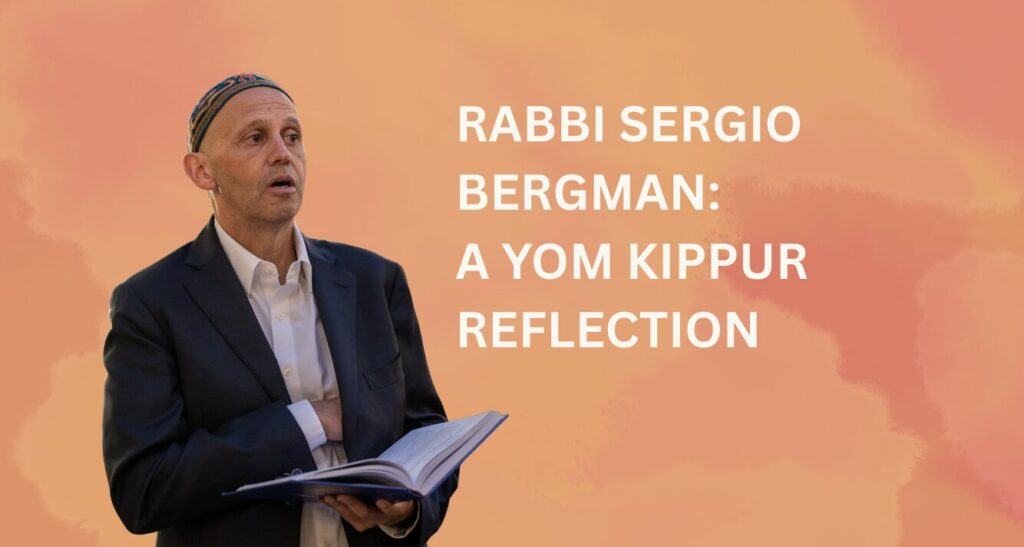
“In the Heavenly Court and in the Earthly Court, with the Consent of the Almighty and with the Consent of the Congregation, We Permit Ourselves to Pray with the Transgressors”
By Rabbi Sergio Bergman, President of the World Union for Progressive Judaism
On the eve of Yom Kippur, before the solemn recitation of Kol Nidrei, we declare that we permit ourselves to pray “with the transgressors.” This phrase, embedded in our liturgy for centuries, has always been paradoxical and thought-provoking. How can one stand before the Creator, on the holiest day of the year, while consciously including those who have harmed, sinned, broken the law, or deceived their fellows? The answer is both simple and profound: the community is incomplete without them. The People of Israel are composed not only of the righteous and the pure, but also of the flawed and the guilty; we have no authority to erase them from our collective whole.
This year, however—two years after the Simchat Torah pogrom, that terrible day of October 7—these words take on a heavier, more painful resonance. They are no longer merely theological or poetic. They are a mirror held up before us. The “transgressors” are not abstract; they are present among us, sometimes occupying the very centers of power, and they have yet to admit their responsibility, to seek forgiveness, or to mend their ways.
No state commission of inquiry has yet been established to investigate the failures of government on the eve of the disaster and during its unfolding. This avoidance is not merely a procedural lapse—it is a moral transgression. It is an evasion of responsibility, an attempt to blur the truth, and often a deliberate effort to turn the public into captives of political narrative instead of demanding accountability. Transgression is not only a criminal act against the law; it is also a civic and moral failure. It occurs when leaders cease to see themselves as servants of the public and instead act as its masters. It occurs when entire sectors of society demand the protection of the state while refusing to bear the burdens of security or taxation, leaving others to shoulder the responsibility.
On this Yom Kippur, while our loved ones remain in captivity in Gaza, while countless families wait in torment for their release or for their burial in Israel, the gulf between the people’s pain and the cynicism of leadership burns more intensely than ever. Citizens yearn for responsibility, sacrifice, and unity—yet in the halls of power we still find personal rivalries, cynical deals with public funds, political extortion, and open corruption. Transgression is no longer on the margins; it occupies center stage.
Nor is this reality limited to Israel. In the Diaspora, we are witnessing a resurgence of antisemitism, cloaked in the rhetoric of anti-Zionism. The pain deepens when Jews themselves
join this chorus. Some confuse legitimate criticism of a particular government with the denial of Israel’s very right to exist and to defend itself. Some justify terror, granting Hamas legitimacy and rewards instead of condemnation, believing that one can love the Jewish people while rejecting love for the State of Israel. This, too, is a moral transgression: a betrayal of the fundamental principle of mutual responsibility between Diaspora Jewry and Israel.
Love of the Jewish people cannot replace love of the State of Israel. Our Jewish identity is incomplete without commitment to Jewish sovereignty, self-defense, and Zionism as a core value. To be part of the community is to embrace this shared responsibility.
The liturgy reminds us of a sharp principle: the Holy One forgives sins committed against God only after we have sought forgiveness from our fellow human beings. Those who have sinned against the public, the community, or the State of Israel cannot rely on silent prayer in the synagogue. They must admit, apologize, and commit to change. Forgiveness is not a magical formula; it is a process of responsibility and transformation.
The declaration that “we permit ourselves to pray with the transgressors” is not an invitation to resign ourselves to sin or corruption. It is not a license to forget injury or to ignore accountability. On the contrary, it is a call to moral courage. It serves as a reminder that there can be no community without justice, no people without truth, and no forgiveness without reconciliation.
This Yom Kippur, more than in any other year, we must recognize that the transgressors are not “they.” They are part of us. They sit beside us in synagogue; they appear on our screens and in the news; they hold the levers of political power. And we can no longer afford to remain silent.
Yom Kippur is a gift of new beginnings—but only if we all, righteous and guilty alike, stand before the truth. Only if we acknowledge that divine forgiveness requires human confession, that reconciliation with Heaven is conditioned on repair on Earth, and that the future of the Jewish people depends on the courage to admit the truth.
